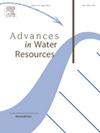Simplifications of macroscopic models for heat and mass transfer in porous media
IF 4
2区 环境科学与生态学
Q1 WATER RESOURCES
引用次数: 0
Abstract
When performing upscaling of transport phenomena in multiscale systems it is not uncommon that terms of different physical nature than those present at the underlying scale arise in the resulting averaged differential equations. For diffusive species mass transfer with heterogeneous reaction and conductive heat transfer, additional terms result from upscaling using the volume averaging method, which are classically discarded by means of orders of magnitude estimates. In this work, these two cases are revisited and it is shown that, for single and two-species diffusive mass transfer with heterogeneous nonlinear reaction, the additional term is exactly zero using Green’s formula. This conclusion is shown to also be applicable when using the periodic homogenization method. Nevertheless, for heat conduction, with and without considering interfacial resistance, only the dominant conduction-corrective terms are shown to be zero also using Green’s formula. In contrast, the contribution of the co-conduction-corrective terms may be relevant depending on the systems characteristics, the properties of the phases and the macroscopic boundary conditions. This is exemplified by performing numerical simulations in a non-symmetric unit cell.
多孔介质中传热传质宏观模型的简化
当对多尺度系统中的输运现象进行升尺度时,在得到的平均微分方程中出现与基础尺度上存在的物理性质不同的项并不罕见。对于具有非均相反应和传导性传热的扩散物质传质,使用体积平均法进行放大会产生附加项,这些附加项通常通过数量级估计被丢弃。本文对这两种情况进行了研究,并表明,对于具有非均质非线性反应的单种和双种扩散传质,使用格林公式,附加项完全为零。这一结论同样适用于周期均匀化方法。然而,对于热传导,考虑或不考虑界面阻力,只有主导的传导校正项被证明为零,也使用格林公式。相反,共导校正项的贡献可能取决于系统的特性、相的性质和宏观边界条件。通过在非对称单元格中进行数值模拟来举例说明这一点。
本文章由计算机程序翻译,如有差异,请以英文原文为准。
求助全文
约1分钟内获得全文
求助全文
来源期刊

Advances in Water Resources
环境科学-水资源
CiteScore
9.40
自引率
6.40%
发文量
171
审稿时长
36 days
期刊介绍:
Advances in Water Resources provides a forum for the presentation of fundamental scientific advances in the understanding of water resources systems. The scope of Advances in Water Resources includes any combination of theoretical, computational, and experimental approaches used to advance fundamental understanding of surface or subsurface water resources systems or the interaction of these systems with the atmosphere, geosphere, biosphere, and human societies. Manuscripts involving case studies that do not attempt to reach broader conclusions, research on engineering design, applied hydraulics, or water quality and treatment, as well as applications of existing knowledge that do not advance fundamental understanding of hydrological processes, are not appropriate for Advances in Water Resources.
Examples of appropriate topical areas that will be considered include the following:
• Surface and subsurface hydrology
• Hydrometeorology
• Environmental fluid dynamics
• Ecohydrology and ecohydrodynamics
• Multiphase transport phenomena in porous media
• Fluid flow and species transport and reaction processes
 求助内容:
求助内容: 应助结果提醒方式:
应助结果提醒方式:


